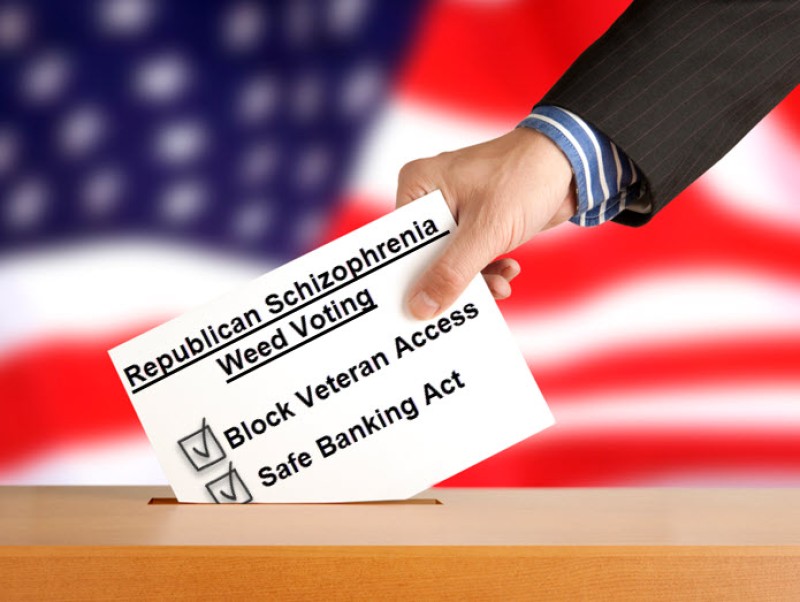The Struggle is Real for Republicans and Weed
Schizophrenia and cannabis made the news this week as a new study shows young men who use cannabis at a high frequency may have higher trends towards schizophrenia. The study may want to look at Repubilcan politicians in US as well, as on one hand they co-introduce the SAFE Banking act, and on the other they block medical access to the plant for veterans stuffering with PTSD.
In Congress, a bipartisan bill to reform federal banking laws to provide easier access to financial services for legal marijuana businesses has been reintroduced. This development has bolstered cannabis stocks in Thursday's trading and given the industry a sense of optimism for a potentially more favourable future. Is "good news" the new "fake news" in the weed industry?
Jeff Merkley, a Democrat from Oregon, and Steve Daines, a Republican from Montana, spearhead the latest attempt to pass the Senate's Secure and Fair Enforcement Banking Act (SAFE Banking Act). Meanwhile, the House of Representatives version is being led by Earl Blumenauer, a Democrat from Oregon, and Dave Joyce, a Republican from Ohio.
Merkley and Daines said they are dedicated to enacting a bill in 2023 that guarantees all legal cannabis enterprises have access to necessary financial services. The announcement was well-received by the markets during the Thursday morning trading session.
The stocks of significant multi-state operators, including Curaleaf Holdings, Green Thumb Industries, and Trulieve Cannabis Corp., surged by up to 12% in price. Curaleaf tweeted that it's about time regulated cannabis markets have protections, creating a safer environment for everyone. The SAFE Banking Act, if passed, would prevent financial institutions that provide services to legal marijuana businesses from being penalized by federal banking regulators.
Although the measure would not address the tax issues caused by Section 280E of the Internal Revenue Code. It would be a much-needed victory for financially struggling cannabis companies seeking federal assistance. Despite passing the House of Representatives seven times in the past, earlier efforts to pass the SAFE Banking Act have consistently failed in the Senate.
Supporters of both big and small cannabis firms believe that the legislation would reduce bureaucratic obstacles. It would also address safety concerns for marijuana businesses currently forced to conduct cash transactions. Additionally, the act would assist small businesses in accessing capital through conventional lending channels that are now unavailable.
Aaron Smith, CEO and co-founder of the National Cannabis Industry Association, commented positively. He stated that since a significant majority of Congress now represents a state where licensed cannabis sales occur, passing this practical and crucial legislation should be one of the Senate's least controversial issues presently.
What Actions are Required?
To advance legislation in the Senate under the outdated cloture rules, sixty votes are required. The Democrats have a narrow majority in the Senate, with 51 seats to the Republicans' 49. In previous attempts to pass the SAFE Banking Act, nine Republicans have supported the legislation as co-sponsors, and the current version has five Republican co-sponsors, including Daines.
The revamped SAFE Banking Act may be submitted to President Joe Biden for signature if it receives support from all nine GOP co-sponsors and every Senate Democrat. While the president hasn't declared his support for the legislation, he did ratify a law reforming cannabis research last year and launch an investigation into marijuana's federal Schedule 1 classification.
Senator Ron Wyden, a co-sponsor of the bill and a Democrat from Oregon, stated in a press release that the SAFE Banking Act must be a top priority for public safety in this Congress. We are now nearer than ever to achieving significant reform. So let's make it happen.
More Political Obstacles: Senate Republicans Block Marijuana Research Bill For Veterans In Procedural Vote
A bill that aimed to research the therapeutic effects of marijuana for military veterans with specific conditions has been halted from advancing to the Senate floor due to Senate Republicans' procedural vote block. Last week, Senate Majority Leader Chuck Schumer filed cloture on a motion to proceed with the VA Medicinal Cannabis Research Act. However, it was rejected with a 57-42 vote along party lines. The bill required 60 votes in support to move forward.
Schumer changed his vote to a "no" to allow him to propose a motion to reconsider under Senate rules. He expressed disappointment, stating that it was unfortunate that the bill that could have significantly assisted veterans did not pass.
While the bill has yet to be officially defeated, the recent vote poses practical concerns regarding the likelihood of the veteran's legislation. It also poses practical problems to other nonpartisan marijuana bills that lawmakers aim to promote, such as the reform of cannabis banking.
Earlier this year, the Senate Veterans Affairs Committee approved the bill, rendering it the first standalone cannabis legislation to garner endorsement from a chamber committee. The bill, championed by committee chair Sen. Jon Tester (D-MT) and Sen. Dan Sullivan (R-AK) as co-sponsor, seeks to mandate that the U.S. Department of Veterans Affairs (VA) explore the medicinal potential of cannabis in treating veterans who grapple with PTSD and chronic pain.
Ahead of the ballot, Tester conceded that the cannabis proposition had sparked controversy among GOP members. Nonetheless, he emphasized that it was crucial to ensure that veterans had a more comprehensive understanding of the role medical marijuana could play in treating war-related injuries.
The latest draft of the bill has undergone modifications, empowering the VA to determine whether it can supervise clinical tests on marijuana for PTSD and chronic pain. This momentous alteration appears to have resolved the objections raised by VA officials who had previously spoken out against earlier editions of the proposal.
In the preceding year, more than 20 organizations dedicated to serving veterans, also known as VSOs, composed a letter addressed to congressional leaders, advocating for a bill that supports research into the correlation between marijuana and veteran health. However, despite their efforts, the bill only materialized after the previous Congress ended.
A sizable defence budget bill was approved during the previous session. However, a clause from the House-approved version that would have permitted Veterans Affairs medical professionals to recommend medical marijuana to veterans residing in cannabis-legalized states was left out. To legalize medical cannabis exclusively for veterans, politicians from both sides in the House and Senate have reintroduced their respective legislation.
Conclusion
After Senate Republicans prevented a procedural vote to advance the VA Medicinal Cannabis Research Act, its future remains uncertain. The plan requires research by the U.S. Department of Veterans Affairs to investigate the medicinal use of marijuana for veterans who have PTSD and persistent pain.
The loss of the cloture vote casts doubt on the chances of other bipartisan marijuana proposals, such as cannabis banking reform, even though the bill isn't officially dead. Legislators and veteran advocacy organizations still fight for medicinal marijuana research and access for veterans despite this setback.








